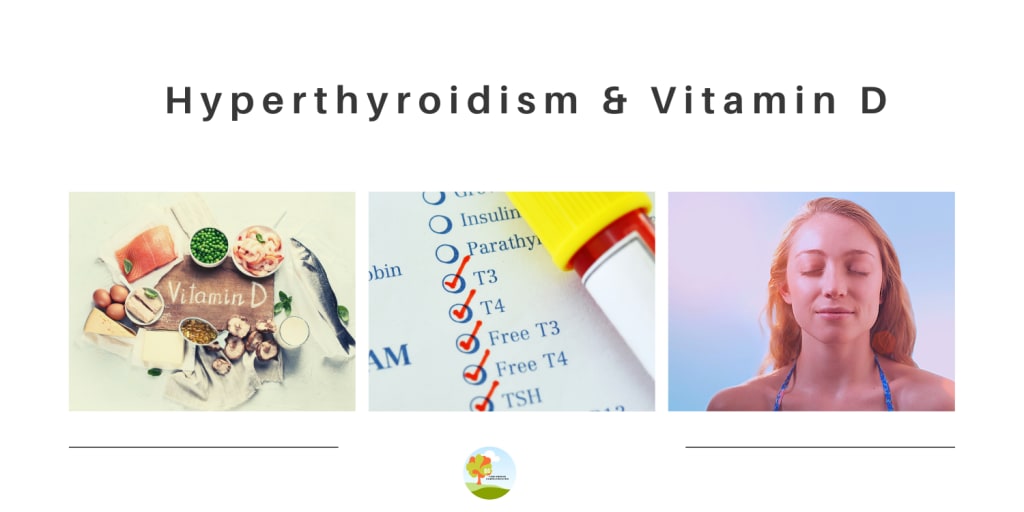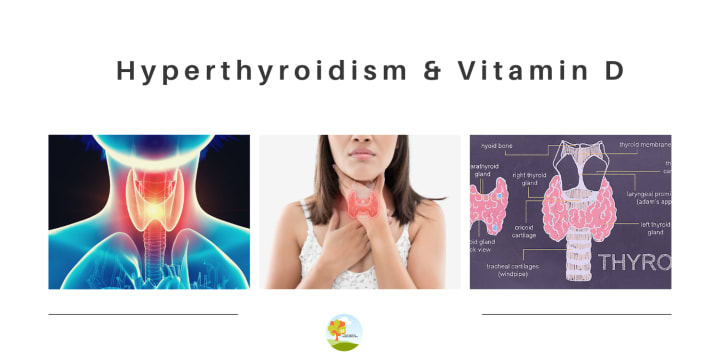Hyperthyroidism and Vitamin D
Low levels of vitamin D may play a role in thyroid disorders

There’s increasing evidence to suggest that low levels of vitamin D may play a role in thyroid disorders. For instance, research has suggested a possible link between vitamin D deficiency and autoimmune thyroid disorders, the most common cause of hypothyroidism (underactive thyroid).
Hyperthyroidism is the overproduction of thyroid hormones (T3 and T4) by the thyroid gland. One of the most common causes of hyperthyroidism is Grave’s Disease - named after the physician who first described it. Antibodies are created by the immune system which attach to the receptors of the thyroid glandular tissue and stimulate them to produce excess hormone.
People with hypothyroidism who took extra vitamin D supplements for 12 weeks had improvements in blood levels of thyroid stimulating hormone.

Does vitamin D or its deficiency have a role in the development of thyroid diseases?
Some, but not all, observational studies have found low blood levels of vitamin D in patients with hypothyroidism (underactive thyroid) as well as hyperthyroidism (an overactive thyroid). It is not clear from these studies if low vitamin D is a cause, a consequence or an innocent bystander in the development of these common thyroid conditions.
It is possible that low vitamin D may permit the under-performing immune system to facilitate progression of thyroid disease. Equally, it is also possible that people with thyroid diseases may have altered health or lifestyle that leads to a low vitamin D state.
What is vitamin D?
Vitamin D is an important factor for overall health, particularly strong and healthy bones. It is also a vital player in ensuring that a number of important organs such as muscles, heart, lungs and brain work well and the immune system is fit to fight against infections.
The body can make its own vitamin D from sunlight. However, adequate vitamin D can also be obtained from supplements and a small amount comes from a few foods. Vitamin D has to be changed by the body a number of times before it can be used.
What does vitamin D do?
Vitamin D is different from other vitamins. While the human body is dependent on various foods for adequate intake of these other vitamins, the body can make its own vitamin D from exposure of skin to sunlight. When the body gets its vitamin D, it turns the vitamin D into a hormone called activated vitamin D or calcitriol. Vitamin D is very important for strong bones and is required to absorb minerals such as calcium and phosphorus. Without enough vitamin D, these minerals cannot be absorbed into the body. Vitamin D is important for general good health, and now researchers are discovering that it may be important for many other reasons outside of good bone health.
Some of the functions of the body that vitamin D has been linked with include:
Immune system
Muscle function
Healthy heart and circulation
Brain development
Anti-cancer effects
Sources of Vitamin D
The main source of vitamin D is sun exposure — when skin soaks up ultraviolet rays it triggers the production of D. Concerns about skin cancer and the increasing use of sunscreen may be one of the reasons for the hike in low vitamin D levels.
Diet is an issue too. Very few foods are natural sources of vitamin D, and although a variety of common foods are fortified with D, they provide relatively small amounts.
Some of the better food sources of vitamin D include:
Cod liver oil (1 tablespoon): 1,360 IU
Swordfish (3 ounces, cooked): 566 IU
Salmon (3 ounces, cooked): 447 IU
Tuna fish (3 ounces water-packed): 154 IU
Orange juice, fortified (1 cup): 137 IU
Nonfat milk, fortified (1 cup): 115 to 124 IU
Yogurt, fortified (6 ounces): 80 IU
Sardines (2 pieces, drained): 46 IU
Beef liver (3 ounces, cooked): 42 IU
Egg (1 large): 41 IU
Cereal, fortified (1 cup): 40 IU
Should everyone be taking vitamin D supplements?
Most people's skin will produce vitamin D in the summer but around a fifth of the population will still be deficient during this period. The situation is likely to be worse over winter. As it is not routinely possible to identify these individuals without everyone having a blood test, Public Health England recommends everyone over 1 years old should take a low dose of vitamin D (10 mcg or 400IU), particularly in the winter months.
The current advice during the Covid-19 pandemic is for people to consider taking a daily supplement every day and to eat foods rich in vitamin D. This advice has been given to promote good bone and muscle health, especially for people spending more times indoors than normal.
The advice to take vitamin D supplements is not given to prevent nor treat Covid-19 as a rapid review undertaken by the National Institute for Health and Care Excellence (NICE) found no evidence to support claims of this.
People found to have vitamin D deficiency may also be prescribed higher therapeutic doses following the appropriate testing and clinical management.
Does vitamin D or its deficiency have a role in the development of thyroid diseases?
Hyperthyroidism
Some, but not all, observational studies have found low blood levels of vitamin D in patients with hypothyroidism (underactive thyroid) as well as hyperthyroidism (an overactive thyroid) due to Gravesʼ disease. It is not clear from these studies if low vitamin D is a cause, a consequence or an innocent bystander in the development of these common thyroid conditions. It is possible that low vitamin D may permit the under-performing immune system to facilitate progression of thyroid disease. Equally, it is also possible that people with thyroid diseases may have altered health or lifestyle that leads to a low vitamin D state. For example, patients with an over-active thyroid due to Gravesʼ disease may increase the breakdown of vitamin D into inactive products, whereas those with an underactive thyroid may spend less time outdoors due to tiredness and thus have reduced sun exposure. Only properly conducted scientific trials will be able to answer this question in a definitive manner.
Summarize
Much more research needs to be done before specific guidelines for using vitamin D to prevent or treat thyroid disease are established by the medical community. However, given the growing understanding of how important vitamin D is to overall health, it’s worth making sure you’re getting enough of it. You might even want to talk to your doctor about testing you for a deficiency, especially if you have a thyroid condition or are at risk for one.
Sources:
https://www.btf-thyroid.org/vitamin-d-and-thyroid-disease
https://www.verywellhealth.com/why-is-vitamin-d-so-important-to-thyroid-patients-3232755
About the Creator
Dany Goldraij
I love marketing , promoting new ideas and new products. I care about healthy life , fitness and dogs.






Comments
There are no comments for this story
Be the first to respond and start the conversation.